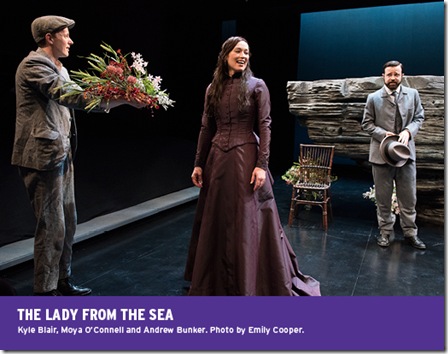Reviews from the Shaw Festival 2015 : Actress Moya O’Connell Scores as Ibsen’s Lady from the Sea.
Moya O’Connell Photo: Emily Cooper
NIAGARA-ON-THE-LAKE, Ont. — the opening image is powerful — a huge boulder rising implacably from the stage of the Shaw Festival’s Court House Theatre. And on top of it, naked and yielding to the dark mysticism of the moment, is the mermaid figure of a woman in anguish over both the lure of the sea and the danger it holds for her.
It is a moment of potent symbolism — augmented by a loud and angry soundscape. The Shaw Festival’s production of Henrik Ibsen’s Lady From The Sea has seized our attention immediately — thanks to the combined efforts of director Meg Roe, designer Camillia Koo, lighting wizard Kevin Lamotte, sound expert Alessandro Juliani, and actress Moya O’Connell who will go on to deliver a haunting performance in the title role.
Nevertheless, this can be a dangerous way to open a production. Many a director becomes obsessed with bringing off a Big Effect at the beginning of things; then, having shot its bolt, a production has no way to go but down. The hazards seem especially acute in the case of The Lady from the Sea: Canadian playwright Erin Shields’s exemplary new version gives us a play of such intimacy and subtlety that its seismic tensions often seem a mere quiver beneath the emotional surface.
But director Meg Roe and her cast make those tensions palpable, rationing the big moments, honouring subtext and harnessing the power of understatement in order to explore the crisis facing the play’s title character, Ellida Wangel.
A few seasons ago, Moya O’Connell triumphed in the role of Hedda Gabler at the Shaw. But the 1888 Lady from the Sea is a different kind of Ibsen play. To be sure, Ellida, a lighthouse keeper’s daughter, has something in common with the monstrous heroine of Hedda Gabler, as well as with Norah in A Doll’s House, in that she feels trapped — indeed, imprisoned — in her marriage to the elderly Dr. Wangel. Like those more famous Ibsen women, she yearns for freedom — a freedom that she equates in her case with the sea that surrounded her in childhood and continues to hold a dangerously seductive grip on her emotions. But she differs from Norah and Hedda in one significant degree: for all the tensions in her marriage, her affection for her husband is genuine, and — as we learn later — he is far less controlling than some of those other husbands who people Ibsen’s dramatic landscape.
So yes, the characters in The Lady From The Sea are — in characteristically Ibsenite fashion — negotiating treacherous waters. And yes, they are predictably in jeopardy because of events of the past. But Ibsen proves to be in a more humane and hopeful mood here, which perhaps explains why this play is disliked in some contemporary circles.
Nevertheless, the intensity of Ellida’s crisis is palpable — stemming from the continuing lure of the now-distant sea, unease with her two adult stepdaughters, the continuing anguish over a dead child, a sense of incompleteness in her relationship with her husband. And looming large in her memory is the potent presence of a sailor whom she once loved, a man forced to flee after murdering his captain but not before he forced a pledge from her that she would be waiting for him when he returns. Now he is back to claim her for his own.
O’Connell is delivering a performance of quicksilver brilliance here. Her Ellida is a warm and vibrant human being, a creature with a great capacity for love but beset by shifting emotions that test her loyalties and indeed her sanity. But it is also a layered performance: witness those moments of coiled tension underlying the outward serenity.
The Lady From The Sea is a mysterious play — which is why it can be so tantalizing in a production as good as this one. Indeed, Ellida often seems shrouded by the mists of mystery. How well do we really know her? Can she herself really define the contrary forces threatening to smother and destroy her? It is a virtue of O’Connell’s performance she remains something of an enigma to the end.
Mystery also surrounds the Sailor whose return triggers her final crisis. This is a play awash in symbolism, no more so than with this character, given that Ibsen refuses to give him a name and describes him simply as The Stranger. It’s a tricky role to play — one which John Neville brought off brilliantly in one of his last London appearances — but Mark Uhre’s wraith-like performance works: he seems a character of the shadows, not entirely real yet projecting enough of a sexual presence to inject a further component into Ellida’s distress.
This is a production in which the emotional wiring between the characters gives events their dramatic thrust. The ever dependable Ric Reid plays Dr. Wangel with tact and sympathy: this is an essentially decent man whose scenes with his restless wife carry both the sting of honesty and the glow of compassion, and who ultimately comes to graceful terms with the true meaning of freedom in a relationship. A fine, fine performance.
There is some solid supporting work in this production. Jacqueline Thair and Darcy Gerhart offer nicely contrasting performances as the two stepdaughters. Andrew Bunker is a bit of a cipher as Arnholm, the school headmaster who successfully woos one of these discontented young women, but Kyle Blair is a frail delight as a consumptive young artist. And Neil Barclay is one hand to do one of his own smoothly modulated turns, this time as a local brimming over with philosophical goodwill.
(The Lady From The Sea continues at The Shaw Festival to Sept. 13. Ticket information at 1 800 511 7429 or shawfest.com)
